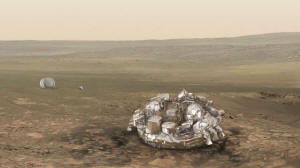|
European scientists puzzle over Mars
lander's radio silence
 Send a link to a friend
Send a link to a friend
 [October 20, 2016]
FRANKFURT/BERLIN (Reuters) - A
European lander that descended to Mars on Wednesday has failed to send
signs of life to its mothership, leaving scientists uncertain whether it
touched down on the Red Planet gently as planned, or crashed and broke
apart, the European Space Agency (ESA) said. [October 20, 2016]
FRANKFURT/BERLIN (Reuters) - A
European lander that descended to Mars on Wednesday has failed to send
signs of life to its mothership, leaving scientists uncertain whether it
touched down on the Red Planet gently as planned, or crashed and broke
apart, the European Space Agency (ESA) said.
"We've had two overflights (by Mars orbiters) and there was no signal,"
ESA Spacecraft Operations Manager Andrea Accomazzo told journalists on
Thursday.
The disc-shaped 577-kg (1,272 lb) Schiaparelli, which is testing
technologies for a rover due to follow in 2020, represents only the
second European attempt to land a craft on Mars. Britain's Beagle 2 was
sent down by the Mars Express spacecraft in 2003 but never made contact
after failing to deploy its solar panels on landing.
The primary part of the current Russian-European ExoMars mission,
bringing the Schiaparelli lander's mothership into orbit around Mars to
search for signs of life, was meanwhile a success.

Scientists said they had received data from Schiaparelli covering its
entry into the Martian atmosphere and the deployment of its heat shield
and parachute, which were designed to slow it from a speed of 21,000 km
per hour.
[to top of second column] |

An illustration released by the European Space Agency (ESA) shows
the Schiaparelli EDM lander. A European space lander reached Mars on
October 19, 2016 in what scientists hope will mark a major milestone
in exploration of the Red Planet, but whether it touched down on the
surface in good working condition was far from certain. ESA/ATG
medialab/Handout via REUTERS

But its thrusters, also used to slow down the lander, appeared to have
fired for only a few seconds, much shorter than expected. The
transmission stopped around 50 seconds before the planned touchdown on
Mars, they said.
"We need to understand what happened in the last few seconds before the
planned landing," said David Parker, ESA's Director of Human Spaceflight
and Robotic Exploration.
(Reporting by Maria Sheahan and Victoria Bryan)
[© 2016 Thomson Reuters. All rights
reserved.]
Copyright 2016 Reuters. All rights reserved. This material may not be published,
broadcast, rewritten or redistributed. |